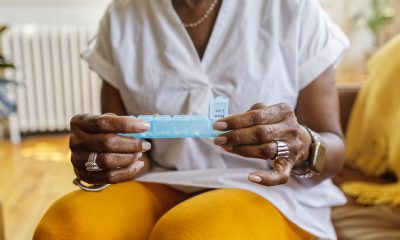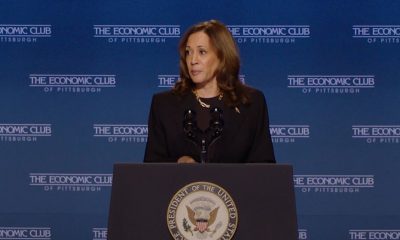Business
CVS Paying $10.4B in Cash for Drug Distributor Omnicare

This March 25, 2014, file photo, shows a CVS store in Philadelphia. CVS Health will buy Omnicare in a deal valued at about $12.7 billion in move to expand its pharmacy services reach into assisted living and senior care facilities. (AP Photo/Matt Rourke, File)
TOM MURPHY, AP Business Writer
CVS Health will pay more than $10 billion for pharmaceutical distributor Omnicare in a deal primed to feed its fast-growing specialty drug business and tap a lucrative and growing market: care for the elderly.
The acquisition announced Thursday will give one of the biggest U.S. pharmacy benefits managers national reach in dispensing prescription drugs to assisted living and skilled nursing homes, long-term care facilities, hospitals and other care providers. Omnicare’s long-term care business operates in 47 states and the District of Columbia.
The deal also will bring in more business doling out specialty drugs. These complex and expensive medications for cancer, hepatitis C and other conditions can represent treatment breakthroughs but are raising growing concerns over cost. Insurers and other bill payers want help containing that expense.
Specialty drug revenue soared 46 percent for CVS Health in the first quarter, helping the company trump analyst expectations and make up for a sales hit from its decision to stop selling tobacco products last year in its drugstores. CVS Health also runs the nation’s second largest drugstore chain, trailing only Wagreens Boots Alliance Inc.
Cincinnati-based Omnicare’s core business involves distributing drugs and providing pharmacy services to long-term care providers, a market CVS Health doesn’t currently serve.
CVS Health CEO Larry Merlo told analysts that represents a “substantial growth opportunity” for his company, with the U.S. population aging.
U.S. Census Bureau researchers have predicted that the population age 65 and older will approach 84 million people by 2050, nearly double its total in 2012, due largely to the aging baby-boom generation.
Merlo noted that older people are more likely to take several medications and can have trouble making sure their prescriptions follow them as they move from their own home to long-term care or other settings. He believes his company can help ease these transitions.
“Omnicare significantly expands our business and provides us with access into a new pharmacy dispensing channel,” Merlo said.
CVS Health said Thursday that it would spend $98 in cash for each Omnicare share. The total value of the deal, expected to close later this year, is $12.7 billion counting about $2.3 billion in debt.
Omnicare has shelled out millions of dollars in recent years to settle federal lawsuits over kickback allegations.
Last June, it agreed to pay more than $124 million to settle lawsuits alleging it gave kickbacks to some facilities so they would keep the company as their drug provider for elderly Medicare and Medicaid recipients. Omnicare said it settled the case to end litigation and committed no wrongdoing.
In 2009, Omnicare said it would pay $98 million to settle allegations that it solicited or paid a variety of kickbacks. That included an accusation that it received kickbacks from Johnson & Johnson for recommending that doctors prescribe to nursing home patients the antipsychotic Risperdal, which can hasten death in elderly people with dementia.
In December, the U.S. Department of Justice filed another lawsuit against Omnicare alleging that it received millions of dollars in kickbacks from Abbott Laboratories in exchange for buying and recommending the prescription anti-seizure drug Depakote for controlling behavior problems in nursing home patients with dementia.
CVS Health spokeswoman Carolyn Castel said in an email that these cases amounted to “legacy issues,” and Omnicare management has worked “diligently over the past few years to create a new foundation around regulatory and compliance matters.”
An Omnicare representative did not immediately return a call from The Associated Press seeking comment about the litigation.
Shares of Woonsocket, Rhode Island-based CVS Health Corp. climbed 2.2 percent, or $2.21, to $103.48 in Thursday afternoon trading, while broader indexes edged up slightly. Omnicare Inc. shares advanced $1.63 to $96.26.
___
AP Business Writer Damian J. Troise contributed to this story from New York. Murphy reported from Indianapolis.
Copyright 2015 The Associated Press. All rights reserved. This material may not be published, broadcast, rewritten or redistributed.
Activism
Big God Ministry Gives Away Toys in Marin City
Pastor Hall also gave a message of encouragement to the crowd, thanking Jesus for the “best year of their lives.” He asked each of the children what they wanted to be when they grow up.

By Godfrey Lee
Big God Ministries, pastored by David Hall, gave toys to the children in Marin City on Monday, Dec. 15, on the lawn near the corner of Drake Avenue and Donahue Street.
Pastor Hall also gave a message of encouragement to the crowd, thanking Jesus for the “best year of their lives.” He asked each of the children what they wanted to be when they grew up.
Around 75 parents and children were there to receive the presents, which consisted mainly of Gideon Bibles, Cat in the Hat pillows, Barbie dolls, Tonka trucks, and Lego building sets.
A half dozen volunteers from the Big God Ministry, including Donnie Roary, helped to set up the tables for the toy giveaway. The worship music was sung by Ruby Friedman, Keri Carpenter, and Jake Monaghan, who also played the accordion.
Big God Ministries meets on Sundays at 10 a.m. at the Mill Valley Community Center, 180 Camino Alto, Mill Valley, CA Their phone number is (415) 797-2567.
Activism
First 5 Alameda County Distributes Over $8 Million in First Wave of Critical Relief Funds for Historically Underpaid Caregivers
“Family, Friend, and Neighbor caregivers are lifelines for so many children and families in Alameda County,” said Kristin Spanos, CEO, First 5 Alameda County. “Yet, they often go unrecognized and undercompensated for their labor and ability to give individualized, culturally connected care. At First 5, we support the conditions that allow families to thrive, and getting this money into the hands of these caregivers and families at a time of heightened financial stress for parents is part of that commitment.”

Family, Friend, and Neighbor Caregivers Can Now Opt Into $4,000 Grants to Help Bolster Economic Stability and Strengthen Early Learning Experiences
By Post Staff
Today, First 5 Alameda County announced the distribution of $4,000 relief grants to more than 2,000 Family, Friend, and Neighbor (FFN) caregivers, totaling over $8 million in the first round of funding. Over the full course of the funding initiative, First 5 Alameda County anticipates supporting over 3,000 FFN caregivers, who collectively care for an estimated 5,200 children across Alameda County. These grants are only a portion of the estimated $190 million being invested into expanding our early childcare system through direct caregiver relief to upcoming facilities, shelter, and long-term sustainability investments for providers fromMeasure C in its first year. This investment builds on the early rollout of Measure C and reflects a comprehensive, system-wide strategy to strengthen Alameda County’s early childhood ecosystem so families can rely on sustainable, accessible care,
These important caregivers provide child care in Alameda County to their relatives, friends, and neighbors. While public benefits continue to decrease for families, and inflation and the cost of living continue to rise, these grants provide direct economic support for FFN caregivers, whose wages have historically been very low or nonexistent, and very few of whom receive benefits. As families continue to face growing financial pressures, especially during the winter and holiday season, these grants will help these caregivers with living expenses such as rent, utilities, supplies, and food.
“Family, Friend, and Neighbor caregivers are lifelines for so many children and families in Alameda County,” said Kristin Spanos, CEO, First 5 Alameda County. “Yet, they often go unrecognized and undercompensated for their labor and ability to give individualized, culturally connected care. At First 5, we support the conditions that allow families to thrive, and getting this money into the hands of these caregivers and families at a time of heightened financial stress for parents is part of that commitment.”
The funding for these relief grants comes from Measure C, a local voter-approved sales tax in Alameda County that invests in young children, their families, communities, providers, and caregivers. Within the first year of First 5’s 5-Year Plan for Measure C, in addition to the relief grants to informal FFN caregivers, other significant investments will benefit licensed child care providers. These investments include over $40 million in Early Care and Education (ECE) Emergency Grants, which have already flowed to nearly 800 center-based and family child care providers. As part of First 5’s 5-Year Plan, preparations are also underway to distribute facilities grants early next year for child care providers who need to make urgent repairs or improvements, and to launch the Emergency Revolving Fund in Spring 2026 to support licensed child care providers in Alameda County who are at risk of closure.
The FFN Relief Grants recognize and support the essential work that an estimated 3,000 FFN caregivers provide to 5,200 children in Alameda County. There is still an opportunity to receive funds for FFN caregivers who have not yet received them.
In partnership with First 5 Alameda County, Child Care Payment Agencies play a critical role in identifying eligible caregivers and leading coordinated outreach efforts to ensure FFN caregivers are informed of and able to access these relief funds.FFN caregivers are eligible for the grant if they receive a child care payment from an Alameda County Child Care Payment Agency, 4Cs of Alameda County, BANANAS, Hively, and Davis Street, and are currently caring for a child 12 years old or younger in Alameda County. Additionally, FFN caregivers who provided care for a child 12 years or younger at any time since April 1, 2025, but are no longer doing so, are also eligible for the funds. Eligible caregivers are being contacted by their Child Care Payment Agency on a rolling basis, beginning with those who provided care between April and July 2025.
“This money is coming to me at a critical time of heightened economic strain,” said Jill Morton, a caregiver in Oakland, California. “Since I am a non-licensed childcare provider, I didn’t think I was eligible for this financial support. I was relieved that this money can help pay my rent, purchase learning materials for the children as well as enhance childcare, buy groceries and take care of grandchildren.”
Eligible FFN caregivers who provided care at any time between April 1, 2025 and July 31, 2025, who haven’t yet opted into the process, are encouraged to check their mail and email for an eligibility letter. Those who have cared for a child after this period should expect to receive communications from their child care payment agency in the coming months. FFN caregivers with questions may also contact the agency they work with to receive child care payments, or the First 5 Alameda help desk, Monday through Friday, from 9 a.m. to 5:00 p.m. PST, at 510-227-6964. The help desk will be closed 12/25/25 – 1/1/26. Additional grant payments will be made on a rolling basis as opt-ins are received by the four child care payment agencies in Alameda County.
Beginning in the second year of Measure C implementation, FFN caregivers who care for a child from birth to age five and receive an Alameda County subsidized voucher will get an additional $500 per month. This amounts to an annual increase of about $6,000 per child receiving a subsidy. Together with more Measure C funding expected to flow back into the community as part of First 5’s 5-Year Plan, investments will continue to become available in the coming year for addressing the needs of childcare providers in Alameda County.
About First 5 Alameda County
First 5 Alameda County builds the local childhood systems and supports needed to ensure our county’s youngest children are safe, healthy, and ready to succeed in school and life.
Our Mission
In partnership with the community, we support a county-wide continuous prevention and early intervention system that promotes optimal health and development, narrows disparities, and improves the lives of children from birth to age five and their families.
Our Vision
Every child in Alameda County will have optimal health, development, and well-being to reach their greatest potential.
Learn more at www.first5alameda.org.
Black History
Alfred Cralle: Inventor of the Ice Cream Scoop
Cralle learned carpentry, mechanics, and blacksmithing at a young age. These skills would later become essential in his innovative work. As a young man, he moved to Washington, D.C., where he worked as a porter in hotels and at an ice cream shop. It was there that he first noticed a common problem: scooping ice cream was messy and inefficient. Servers struggled because the ice cream stuck to spoons and ladles, and getting the right shape and portion was difficult. Many needed two hands — one to scoop and one to scrape the ice cream off the spoon.

By Tamara Shiloh
Alfred L. Cralle, an African American inventor and entrepreneur, forever changed the way the world enjoys ice cream. Born on Sept. 4, 1866, in Kenbridge, Virginia, Cralle grew up during Reconstruction — a time when opportunities for African Americans were still extremely limited. Despite the challenges of the era, he demonstrated curiosity, creativity, and a natural ability to understand how tools and machinery worked.
Cralle learned carpentry, mechanics, and blacksmithing at a young age. These skills would later become essential in his innovative work. As a young man, he moved to Washington, D.C., where he worked as a porter in hotels and at an ice cream shop. It was there that he first noticed a common problem: scooping ice cream was messy and inefficient. Servers struggled because the ice cream stuck to spoons and ladles, and getting the right shape and portion was difficult. Many needed two hands — one to scoop and one to scrape the ice cream off the spoon.
Cralle believed there had to be a better way.
Using his mechanical training, he began sketching and experimenting with ideas for a tool that could scoop ice cream easily using one hand. After refining his design, he developed what would become a simple yet brilliant invention: the Ice Cream Mold and Disher. On Feb. 2, 1897, Cralle received U.S. Patent No. 576,395 for the device.
His invention — what we now call the ice cream scoop — was groundbreaking. It featured a built-in scraper that automatically released the ice cream with a single squeeze of the handle. Durable, easy to use, and requiring only one hand, the scoop made serving faster and more consistent. His design was so effective that the basic mechanism is still used today in homes, restaurants, and ice cream shops around the world.
Although his invention became widely used, like many African American inventors of his time, he did not receive the compensation or widespread recognition he deserved. Racial barriers prevented him from fully benefiting from his own creation, even as businesses embraced the tool and the popularity of ice cream continued to grow.
After patenting the scoop, Cralle moved to Pittsburgh. There, he worked as a porter for the luxurious Sterling Hotel and later became a successful businessman. He remained active in his community and continued to create opportunities for himself despite the limitations faced by African Americans at the turn of the 20th century.
Tragically, Cralle died in 1920 at age 54, leaving behind a legacy that would only be fully appreciated long after his passing. Today, he is remembered as the brilliant mind behind one of the most widely used and universally loved kitchen tools.
-

 Alameda County4 weeks ago
Alameda County4 weeks agoSeth Curry Makes Impressive Debut with the Golden State Warriors
-

 Bay Area2 weeks ago
Bay Area2 weeks agoPost Salon to Discuss Proposal to Bring Costco to Oakland Community meeting to be held at City Hall, Thursday, Dec. 18
-

 #NNPA BlackPress4 weeks ago
#NNPA BlackPress4 weeks agoFBI Report Warns of Fear, Paralysis, And Political Turmoil Under Director Kash Patel
-

 Activism2 weeks ago
Activism2 weeks agoMayor Lee, City Leaders Announce $334 Million Bond Sale for Affordable Housing, Roads, Park Renovations, Libraries and Senior Centers
-

 Activism3 weeks ago
Activism3 weeks agoOakland Post: Week of December 10 – 16, 2025
-

 Arts and Culture2 weeks ago
Arts and Culture2 weeks agoFayeth Gardens Holds 3rd Annual Kwanzaa Celebration at Hayward City Hall on Dec. 28
-

 Activism2 weeks ago
Activism2 weeks agoOakland School Board Grapples with Potential $100 Million Shortfall Next Year
-

 #NNPA BlackPress4 weeks ago
#NNPA BlackPress4 weeks agoMoney, the NCAA and College Athletics: Congress Considers Changes to Name, Image and Likeness Rules



























































